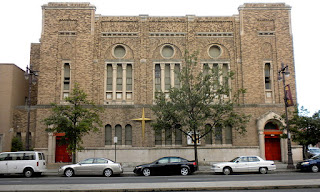He was no
doubt looking back a bit, and reflecting on the previous 50-plus years spent
overcoming. Charles Albert Tindley might have thought he had finally accomplished
something by 1905, but perhaps he never lost sight of where he’d been when he
uttered the prayer “Stand By Me”. The Philadelphia church (see its picture
here) where he ministered would eventually wear his name, but that wouldn’t
change his mind about who’s church it really was, and to whom he owed his life’s
purpose. He’d been through too many episodes, and many lay in front of him, for
him to forget the God whom he must have felt was his mainstay. Charles Tindley had
plenty of reminders, including in the people around himself, to keep his faith
centered on the object of his prayer.
Charles
Tindley was what some people might have called a self-made man, although his
song’s words would not have agreed with such an assertion. Lacking formal education
through his entire life, this black man and son of a slave nevertheless was a determined
person who learned on his own to read and write by his late teens, and then
went to night school while working as a janitor to acquire his divinity degree through
correspondence. He would probably tell us if he were here today that he had
plenty of help from tutors along the way, but his own ambition –such as working
for little or no pay, in the post-Civil War era –also spurred his climb. He was
formally ordained into ministry in the late 1880s, despite the lack of a
degree. Capping his rise, Charles became the full-time pastor of a Philadelphia
church where he had been a janitor, following some 15 years of short-term
stints at several churches in New Jersey, Delaware, and Maryland. Tindley had
endured to attain the position in the city of brotherly love by 1902, so it
must have still been fresh in his mind as a 50-something just how far and how
long he’d been engaged in this ascent. Indeed, he had been hiking up a virtual
mountain his entire life. He wasn’t satisfied with his own status, however.
Others around him needed jobs, food, and homes, so it became part of Tindley’s mission
over the next several years to work to secure a better existence for his church’s
members through the cooperation and assistance of the business community in the
city. Some of the words he penned in ‘Stand By Me’ could be considered
autobiographical, but he must have been observing life’s struggles through the
eyes of many others in the early 1900s, too. Each of the five stanzas he wrote pointed
toward skirmishes probably he had experienced or that his friends were experiencing.
Raging storms (v.1), tribulation (v.2), faults and failures (v.3), persecution
(v.4), and finally the frailty of old age (v.5) were all in Charles’ field of
vision. The answer for all was the same: a look heavenward, and a call for the strength
of His presence.
One can imagine
that Charles Tindley kept singing his prayer beyond 1905. Through the following
decade, and probably beyond, Tindley and others protested racist events in
Philadelphia, suffering physical abuse that was all-too common during the era,
and not just in the Jim-Crow South. It was a time when many blacks must have felt
that God, and too-few white folks in the nation, really cared about their
plight. Tindley’s church grew from 130 to over 12,000 by the time of his death
two decades later, probably as people clung to one another for support and
looked above for solace. Today, you could say some things have improved. But, ‘stand
by me’ isn’t a phrase that’s obsolete because the early 1900s has passed. New
era, with the same issues in new skin. Same God, too.
See more
information on the song story in this source: The Complete Book of
Hymns – Inspiring Stories About 600 Hymns and Praise Songs by William J.
Petersen and Ardythe Petersen, Tyndale House Publishers, 2006.
Brief
information about the author is here: http://www.hymntime.com/tch/bio/t/i/n/tindley_ca.htm
Also see this link, showing all the song’s words: http://www.hymntime.com/tch/htm/s/t/a/n/standbym.htm


No comments:
Post a Comment